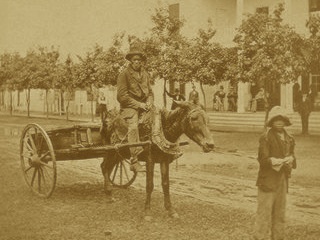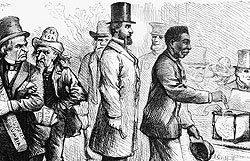"Forty Acres and a Mule" -- The Elusive Promise
Dan Bryan, March 6 2012
 Two freed slaves in Florida.
Two freed slaves in Florida.The great hope of the emancipated slaves
The freed slaves needed land to prosper. Released from physical bondage, they owned nothing, had no education, no connections in society, and no access to money or credit. Four million of them began a new era in this way, in the spring of 1865.
On January 16, 1865, William Tecumseh Sherman issued orders calling for the confiscation of land in Georgia and South Carolina, to be redistributed to freed slaves. By the summer of that year, roughly 400,000 acres of farmland had been divided amongst 10,000 freed slaves. Many of the slaves received a mule. From this limited program emerged the infamous cry of "forty acres and a mule".
Land was everything in the south. Cotton was the crop that made its economy, not just in slavery but also for many decades after the war ended. The freed slaves knew that their autonomy depended on the land, and so too did the planters who had just lost their war. Southern whites made it very clear that they would never accept the legitimacy of any system that took land from them and gave it to the black people.
The rumors continued through the summer and the fall. Thaddeus Stevens -- congressman of Pennsylvania -- called for the redistribution of 394 million acres. In doing so he aroused the eternal contempt of the southern landowners. Some stories pointed to Christmas or New Year's as the day when an official announcement would be made. When those dates passed, black people looked further into the future for the great proclamation.
Employment without cash -- the birth of sharecropping
During slavery, black people had worked in field gangs, living and sleeping together in groups, often communally in barracks. Now in 1865, the price of cotton was high, and the planters of the south were bankrupt in every way except in property. They tried recruiting blacks to work again in field gangs, and as free men the black people balked at that notion.
Though the cultivation of cotton was a hard way to make a life, there were few other options. The south was not industrialized, and few jobs existed outside of the old farms and plantations. Through necessity, the freed slaves began to enter into work contracts with the white landowners. The Freedmen's Bureau assisted many in negotiating their employment contracts.
Due to the destruction of the southern banking system in the war, there was not enough physical currency in circulation to base employment upon the payment of wages. Since the freed slaves refused to join work gangs, most landowners divided their fields into plots and rented them out to blacks and whites alike. In exchange for use of the land, the tenant would turn a portion of their harvest over to the landowner. The name for this arrangement was sharecropping.
A priori, sharecropping was a good arrangement that allowed agriculture to function in the absence of hard currency. Though it was always a marginal way of life, the presence of the Freedman's Bureau, Federal troops, and Republican governments acted somewhat as a check against the dark potential of this system for the worker. The Freedman's Bureau ultimately assisted in negotiating several hundred thousand labor contracts throughout the 1860s.
Lurking behind this protection was a potential for the system to transform, insidiously, into something bordering on peonage.
Union Leagues and Republican government
Throughout the 1860s, the freed slaves had powerful allies in the U.S. Congress. At first, Andrew Johnson instituted a lenient program of readmission to the Union, with very limited aims. Johnson had no desire to change the racial hierarchy of the south, from which he hailed. Southern states took advantage and passed the ""Black Codes"", which restricted voting and other rights.
The Republican Congress, joined by President Ulysses Grant after 1869, passed increasingly far-reaching legislation to protect the voting rights and civil rights of the freed slaves. The Fourteenth, and Fifteenth Amendments were ratified to this purpose. The Black Codes were swept out in the process. Southern states were forced to accept the rights of the black community before they could be re-admitted to the union. Many former confederates were not allowed to vote until a few years after the war ended. Consequently, most state and local governments in the south consisted greatly of black men, southern Unionists, and northern Republicans.
Locally, this coalition was supported by the Union Leagues, also known as "Loyal Leagues". These clubs met frequently and offered a source of community and mutual aid to the black communities of the south. They also served to mobilize the Republican vote and were closely tied to the Republican Party. Like most things with the mark of northern support, the Union Leagues were hated by the native southern whites.
 A freed slave votes in the 1868 elections.
A freed slave votes in the 1868 elections.While the Republican coalition provided aid to the black community and helped out greatly in the area of education, the hopes for land reform were never addressed. Gradually the rumors died, withering in manner that all unfulfilled dreams fade into the background.
The triumph of sharecropping -- a tenant system
The promise of land redistribution for the freed slaves remained unfulfilled. By 1868 the sharecropping system had become widespread, in spite of the political power of the Republicans.
One exception was the Mississippi Delta region in northwest Mississippi (a long narrow strip between the Mississippi and Yazoo rivers). The land in this area was densely wooded and covered with swamps. Clearing even a small plot was a Herculean task, fraught with risk of malaria and death. This danger left an opening for enterprising blacks to clear their own plots, and some independent farms were established. There were other scattered places where through luck, homesteading, or hard work, black families were able to acquire land of their own.
In general though, the vast majority would be pulled into the sharecropping system. Estimates from later determined about 70-80% of southern blacks were sharecroppers, though the exact number is hard to determine accurately. In spite of the political gains that they had made, this was the economic reality that confronted most freed slaves as they entered the 1870s.
Recommendations/Sources
- John Hope Franklin - Reconstruction after the Civil War
- Jacqueline Jones - Soldiers of Light and Love: Northern Teachers and Georgia Blacks, 1865-1873
